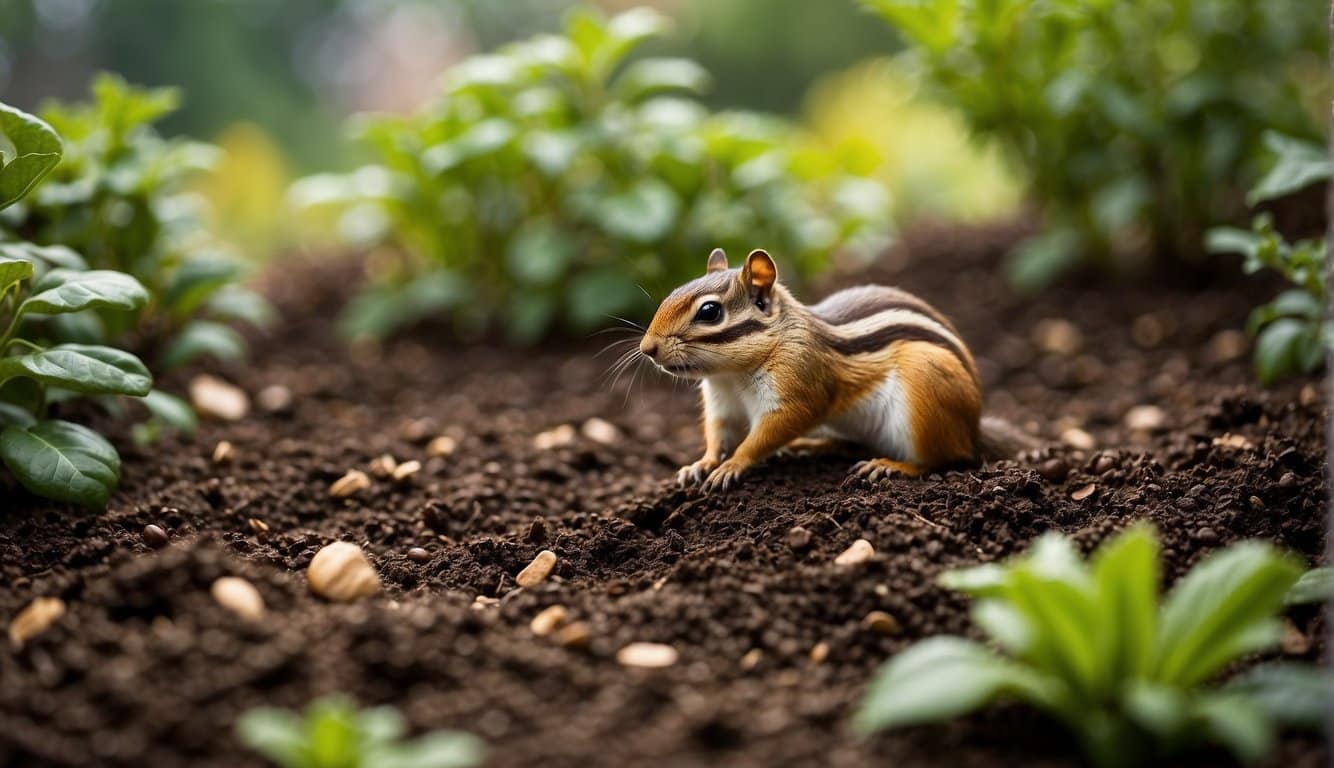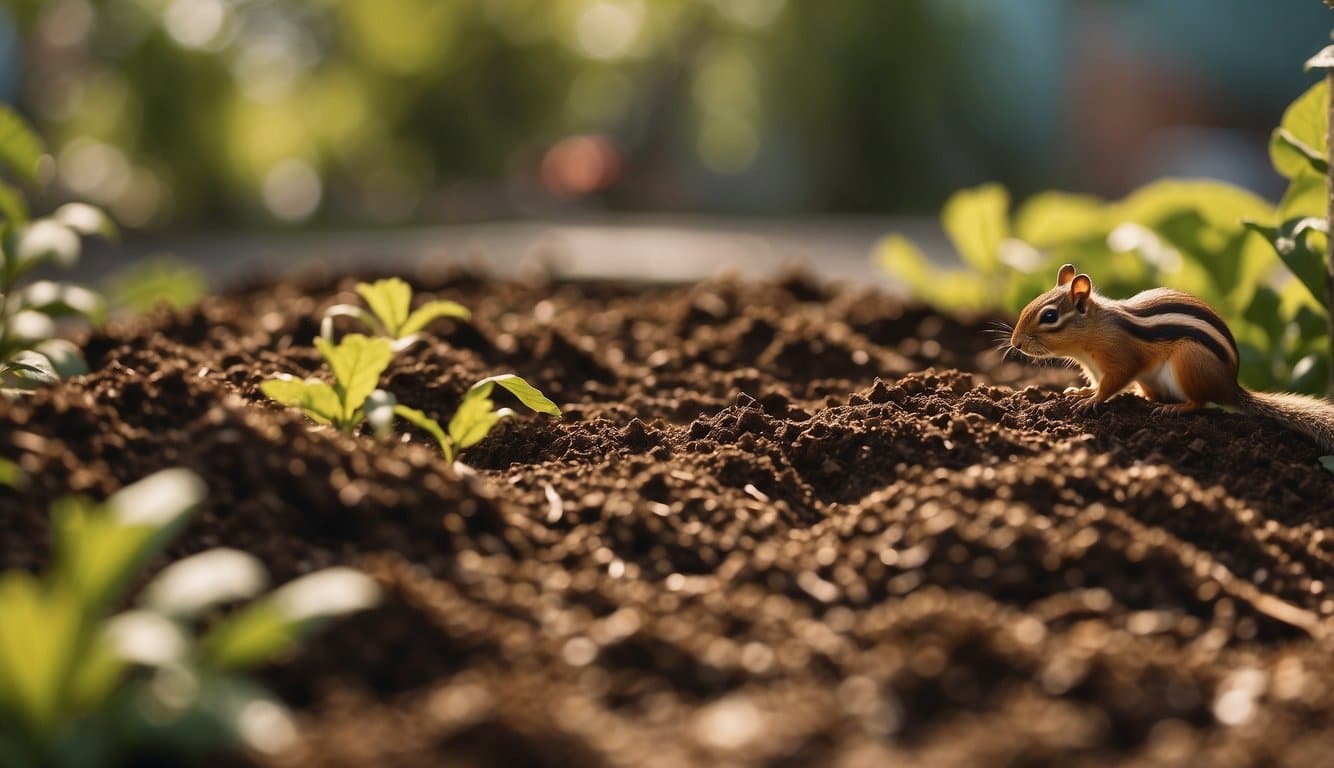In the ongoing quest to protect gardens from the playful yet often destructive behaviors of chipmunks, homeowners and gardeners are continually seeking effective, humane, and natural deterrents.
Coffee grounds, a common household waste product, have emerged as a popular recommendation. Advocates for the use of coffee grounds suggest that their strong odor acts as a natural repellant, potentially preventing chipmunks from tampering with plants and digging in yards.

While anecdotal evidence supports the repellant qualities of coffee grounds against chipmunks, the overall efficacy can vary depending on a number of factors.
These grounds are proposed to work by emitting a robust aroma that is off-putting to the small mammals, encouraging them to seek food and shelter elsewhere.
However, the method’s success may be influenced by the specific application technique and the presence of other attractants in the environment.
Moreover, while coffee grounds may offer a simple and eco-friendly solution, it’s important to consider any additional benefits and limitations they may present in the context of garden and animal welfare.
Key Takeaways
- Coffee grounds are believed to repel chipmunks due to their strong odor.
- The success of using coffee grounds for deterrence can vary.
- Consideration of application techniques and overall impact is essential.
Effectiveness of Coffee Grounds Against Chipmunks
In exploring natural methods to deter chipmunks, coffee grounds have emerged as a popular option. This section examines the validity of such claims and how they stack up against commercial solutions.
Scientific Evidence
Research on the use of coffee grounds as a repellent for chipmunks is mostly anecdotal with a lack of extensive scientific studies.
However, many gardeners report that the strong smell of coffee deters chipmunks. It is thought that the scent may interfere with their ability to smell food sources and predators, encouraging them to avoid the area.
Despite these claims, there are no conclusive scientific reports to firmly establish the effectiveness of coffee grounds as a reliable deterrent.
Comparison with Commercial Repellents
When compared to commercial repellents, coffee grounds are an environmentally friendly and cost-effective alternative.
Commercial repellents often contain chemicals which can have a negative impact on the ecosystem, pets, and humans, whereas coffee grounds are a natural byproduct.
Here is a comparison of key attributes:
| Attribute | Coffee Grounds | Commercial Repellents |
|---|---|---|
| Cost | Inexpensive | Varies, generally more costly |
| Environmental Impact | Eco-friendly, decomposable | Potential chemical pollutants |
| Application Frequency | Must be replenished often | Typically long-lasting |
| Ease of Access | Readily available at home | Store-bought, less accessible |
While coffee grounds may require more frequent application, they serve as a safer alternative for those seeking natural pest control methods.
Applying Coffee Grounds for Deterrence
Using coffee grounds can be an effective and natural strategy for keeping chipmunks at bay. It is crucial to understand the appropriate methods of application and the frequency and quantity necessary for successful deterrence.
Methods of Application
The strategic placement of coffee grounds plays a pivotal role in deterring chipmunks.
Gardeners can sprinkle dry coffee grounds around the base of garden plants, particularly those that are prone to chipmunk damage. Additionally, they can incorporate grounds into the top layer of soil.
This not only helps in repelling chipmunks but also enriches the soil with nutrients. For a more targeted approach, placing grounds into small porous bags and hanging these near sensitive areas can localize the repellent effect.
Frequency and Quantity
The effectiveness of coffee grounds as a deterrent can depend on regular reapplication and using adequate quantities.
After rainfall or watering, it is advisable to reapply the grounds, as this can diminish their scent, which is essential for repelling chipmunks.
As for quantity, a thin layer of grounds is often sufficient. However, in areas with high chipmunk activity, a more generous application might be necessary. A table below provides a guideline for frequency and quantity:
| Location | Frequency of Application | Suggested Quantity |
|---|---|---|
| Around plant bases | Bi-weekly or after rainfall | 1-2 cups |
| Soil incorporation | Monthly | 2-4 cups per square yard |
| Porous bags | As needed or bi-weekly | 1/2 cup per bag |
Frequent inspection will inform the gardener if more coffee grounds are needed to keep the chipmunks from returning.
Additional Benefits and Drawbacks
In considering the use of coffee grounds to repel chipmunks, it’s important to assess both the gardening benefits and the potential risks associated with this method.
Gardening Advantages
- Nutrient-Rich Soil: Coffee grounds can enrich soil with nitrogen, improving plant growth and health.
- Pest Control: While deterring chipmunks, coffee grounds also repel other garden pests such as slugs and snails.
Potential Risks
- Acidification: Overuse can lead to soil acidification, potentially harming plants that prefer neutral to alkaline soil.
- Attracting Unwanted Pests: While repelling chipmunks, coffee grounds may inadvertently attract pests that enjoy the scent of coffee.
Frequently Asked Questions
Exploring various methods to deter pesky chipmunks can be valuable for gardeners and homeowners. This section addresses common concerns with practical advice on natural repellents, protective measures, and plants with deterrent properties.
What natural methods can repel chipmunks effectively?
Coffee grounds have been suggested as a natural way to repel chipmunks, as these animals are discouraged by the strong scent. However, effectiveness varies, and one may need to use coffee grounds in conjunction with other methods for better results.
How can I protect my house foundation from chipmunk intrusion?
To protect house foundations, one can use hardware cloth to create barriers or employ gravel-filled trenches to discourage chipmunks from digging. Regular inspections for burrow signs are also prudent to prevent intrusion.
What plants can deter chipmunks and squirrels from the garden?
Chipmunks tend to avoid strong-smelling plants like garlic, peppermint, and daffodils. Incorporating such plants into one’s garden can serve to naturally deter rodents without the use of chemicals.
Are there specific scents known to keep chipmunks at bay?
Scents like peppermint oil, eucalyptus, and citronella are known to deter chipmunks due to their intense aromas. These can be applied in various forms around garden perimeters to keep chipmunks away.
What consequences do coffee grounds have for birds and wildlife?
Used coffee grounds can be safely added to compost or soil as a fertilizer; however, if applied in large quantities, the caffeine residue may have mild toxic effects on wildlife. Care should be taken to not disrupt the ecosystem balance.
What strategies can make chipmunks vacate an area?
Excluding food sources and sealing entry points are effective strategies.
Some individuals also use humane live traps to catch and relocate chipmunks to a more suitable habitat away from human dwellings.
